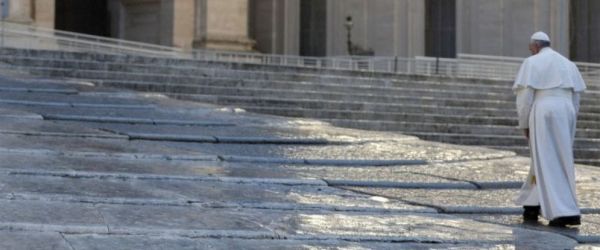Through the Eucharistic celebration the Holy Spirit makes us participants in the divine life that is able to transfigure our whole mortal being. In his passage from death to life, from time to eternity, the Lord Jesus also draws us with him to experience the Passover. In the Mass we celebrate Passover. We, during Mass, are with Jesus, who died and is Risen, and he draws us forth to eternal life. In the Mass we unite with him. Rather, Christ lives in us and we live in him: “I have been crucified with Christ; it is no longer I who live, but Christ”, Saint Paul states, “who lives in me; and the life I now live in the flesh I live by faith in the Son of God, who loved me and gave himself for me” (Gal 2:20). This is what Paul thought.
Indeed, his Blood frees us from death and from the fear of death. It frees us not only from the dominion of physical death, but from the spiritual death which is evil, sin, which catches us each time we fall victim to our own sin or that of others. Thus our life becomes polluted; it loses beauty; it loses meaning; it withers.
Instead, Christ restores our life; Christ is the fullness of life, and when he faced death he destroyed it forever: “By rising he destroyed death and restored life” (cf. Eucharistic Prayer iv). Christ’s Passover is the definitive victory over death, because he transformed his death in the supreme act of love. He died out of love! And in the Eucharist, he wishes to communicate this, his paschal, victorious love, to us. If we receive him with faith, we too can truly love God and neighbour; we can love as he loved us, by giving our life.
If Christ’s love is within me, I can give myself fully to others, in the interior certainty that even if the other were to wound me I would not die; otherwise I should defend myself. The martyrs gave their own lives in this certainty of Christ’s victory over death. Only if we experience this power of Christ, the power of his love, are we truly free to give ourselves without fear. This is the Mass: to enter this passion, death, resurrection, ascension of Jesus; when we go to Mass it is as if were going to Calvary itself. But consider: whether at the moment of Mass we go to Calvary — let us ponder this with the imagination — and we know that that man there is Jesus. But will we allow ourselves to chat, to take photographs, to put on a little show? No! Because it is Jesus! We certainly pause in silence, in sorrow and also in the joy of being saved. As we enter the church to celebrate Mass, let us think about this: I am going to Calvary, where Jesus gave his life for me. In this way the spectacle disappears; the small talk disappears; the comments and these things that distance us from something so beautiful as the Mass, Jesus’ triumph.
I think that it is clearer now how the Passover is made present and active each time we celebrate the Mass, which is the meaning of memorial. Taking part in the Eucharist enables us to enter the Paschal Mystery of Christ, giving ourselves to pass over with him from death to life, meaning there, on Calvary. The Mass is experiencing Calvary; it is not a spectacle.
[Pope Francis, General Audience 22 November 2017]












